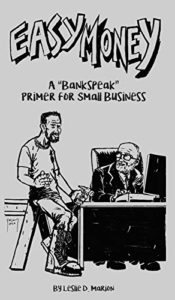Bankers and small-business owners sometimes seem to speak different languages. Fortunately, Leslie Marion (MFA, 2018) is here to translate. Marion, who spent 20 years with RBC and co-owns a consulting firm, is the author of Easy Money: A Bankspeak Primer for Small Business, published in 2020.
Marion and Jack Lawton, her life and business partner, did the King’s MFA in creative nonfiction at the same time. “Jack wanted to go, but I said, ‘You’re not going to have all the fun,’” Marion recalls.
 Easy Money is self-published through Calgary’s 4th Floor Press, which also offers editing services. “It was so simple,” she says. “If I had gone through an editor and publisher, it would have taken two years. But I didn’t want to wait. From beginning to end it probably took four months.”
Easy Money is self-published through Calgary’s 4th Floor Press, which also offers editing services. “It was so simple,” she says. “If I had gone through an editor and publisher, it would have taken two years. But I didn’t want to wait. From beginning to end it probably took four months.”
Her book aims to demystify the financing process. “Lenders don’t understand small businesses, and small businesses don’t understand lenders and how they work,” she says. “I liken it to The Wealthy Barber for small business.”
There may have been a time when business owners could walk into the bank and get a loan based on a handshake and a personal relationship. But those days are long past. Small business owners need to understand “that the person they talk to is not necessarily the decision-maker, and they don’t understand that you need to tell your banker both good news and bad, because they hate surprises,” says Marion, who is based in Calgary. For instance, someone seeking a loan may choose to not mention a 10-year-old bankruptcy. “But if the financial institution found out about that, they would wonder why you haven’t told them. What’s important is not so much that you went bankrupt, but how you dealt with it.”
Another common pitfall for businesses is underselling themselves or failing to have an adequate business plan. One example from Marion’s book is a business whose partners failed to mention they were the only ones in Alberta licensed to offer the services they proposed.
For their part, banks fail to realize how personal success or failure is for many owners of small businesses. “They don’t understand that businesses take it personally when you turn down a loan.”
She adds that programs like Dragon’s Den and Shark Tank have contributed to a distorted view of financing small business. She interviewed an angel investor for her book and says venture capitalists are “unheard of in small business, because they typically do $10 million and north. Angel investors, if you can get one — which small businesspeople can’t normally — might give you money in return for a portion of your business.”
Working on a practical finance book as her MFA project made sense for Marion because it was what she knew best, having served as both an account manager and credit officer at RBC. “When you do the MFA, they encourage you to think about why you are the person to write this book,” she says.
Even so, it’s not the project she had in mind when she started the program. “In the back of my mind, I knew this book had to be written. But I didn’t know I would be the one writing it.” Marion spoke highly of the MFA mentors who helped her through the project. “Most of them didn’t know the subject matter, but they knew how to write and they could understand what I was trying to convey. So they helped a lot — and hopefully they gained some understanding of banks and bankers.”

